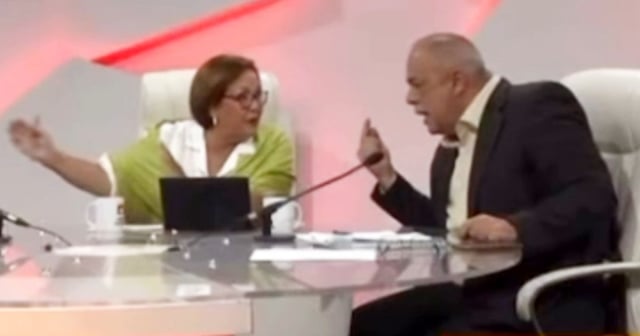The Minister of Energy and Mines, Vicente de La O Levy, acknowledged this Wednesday what was already a cry among Cubans: that the government's strategy to avoid blackouts in the summer failed.
He did it during the Mesa Redonda of Cuban Television, guided by the official journalist and communication strategist from the Palace, Arleen Rodríguez Derivet, who assisted the minister at all times in such a bitter moment of acknowledging failures, something improper for the government of the so-called "continuity."
According to De La O Levy, the planned maintenance during the first half of the year was carried out with the resources available to the country. “These maintenance activities were expected to cause disruptions of about four hours from January to June 30, because we do not have reserve units for generation that would allow us to perform maintenance without affecting the population.”
"The maintenance plan was carried out, but we did not meet the planned hours. What happened? That along with the expected maintenance load, there were significant disruptions this semester regarding fuel, [something] that is reported systematically," said De la O Levy.
"That is the maintenance strategy we follow throughout the semester, which was affected by a lack of fuel and then the blackout hours became... uh... significant hours... up to 12 hours in some places," he added. "It is, of course, an inconvenience, but there are levels of blackouts that are tolerable," De la O Levy remarked at the end of May.
The maintenance, an essential part of the strategy of the government of Miguel Díaz-Canel, was carried out. However, according to the minister, the scheduled interruption hours could not be met because "there were significant issues with fuel, especially in the months of March, May, and some days in June."
"A unit of 100 MW today only generates between 70 and 80 megawatts. The total of all these deficits is around 400 MW due to years of operation and the lack of spare parts. The maintenance we do is just to 'keep them alive,' but we are not putting them back to zero kilometers, as is said in popular speech," said De la O Levy about the technical state of the thermoelectric plants.
Despite attempts to "keep them alive," the minister acknowledged that thermoelectric plants, such as Mariel, have been lost after the fire that broke out in March 2022 in the steam turbine of unit 7.
“To other thermoelectric plants that have been decommissioned for technical reasons because they have been in operation for more than 50 years,” said De la O Levy. “Tallapiedra here in Havana was more than 60 years old and was decommissioned, and this reduces the availability of the fleet alongside others that have had significant breakdowns.”
"On June 30, we stopped the maintenance, and the results were immediately visible. The first days of July and almost throughout the month, the impacts were much lower, with energy delivery to the system even increasing by 10.6%; however, demand continued to grow. At that moment, there were also some fuel failures, although not like in March and May," said the minister appointed by Díaz-Canel to manage the ruins of the national electroenergy system (SEN).
In July and August, the forecasts for the generation of thermal units, Energás, and the barges were met, but distributed generation fell short of expectations.
"We always said that the maintenance would minimize the impacts compared to the previous period, but the blackouts did not stop, and that was the case during the first 15 days of July. But the month of August was extremely tense. The first few days of this month were not as hard as the last ones," said the head of Energy.
What happened then, according to the minister? Well, demand increased, "and then there were also some failures with the fuel issue," emphasized De la O Levy, concerned that the audience of the Mesa Redonda would understand that they did fulfill their obligations, despite having failed in their maintenance strategy.
"During the time of highest demand and consumption, we had an unexpected shutdown of Felton, along with Céspedes. Can this be attributed to poor maintenance quality? We believe not... These are units where we carry out maintenance with the resources we have. We intervene in the part of the thermoelectric plant where we have the resources. If we have resources for the turbine, we intervene in the turbine and do something for the boiler... we clean it. But if we don't have the resources for the boiler, we cannot intervene in the boiler. If we don't have the tubes, if we don't have the steel, if we don't have the sheets, we cannot intervene. So we carry out maintenance with the resources we have."
In summary: the government of Díaz-Canel and its strategy to minimize blackouts... failed miserably.
What do you think?
COMMENTFiled under:
